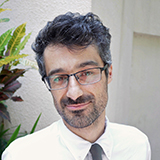May 2020 | Volume 21 No. 2
The Sustainable Practice of Backpacking
Tourists can be a negative for environmental sustainability because they often travel by plane and indulge in extras that they may do more sparingly at home, such as taking long, hot showers every day. But one group of tourists may provide a model for sustainable living, and that is backpackers.
Dr Benjamin Iaquinto studied the practices of international backpackers in Australia over several years to see how they use resources over the long term. His methods included interviews, direct observations and questionnaires.
“The findings were more novel than I expected – that tourists, these leisure seekers, could fall into sustainability effortlessly without really thinking about it,” he said. “Normally, sustainability is seen as a burden on people, something they have to be mindful of and educated about. But the backpackers I studied performed sustainability in their everyday activities and routines inadvertently.”
The infrastructure around them was a big factor. Hostels usually have only one or two stoves for dozens of guests, so backpackers tend to eat communally. The hostels also have few showers and tend to offer only cold-water washes for clothes and no dryers. For cost reasons, backpackers also tend to share rooms and, most importantly, travel by land – usually by bus or shared car.
“Backpackers are unusual because they voluntarily reduce their consumption for long periods of time. They come from rich societies, like Germany or Hong Kong, they eat instant noodles or plain pasta, and they travel 19 hours on buses when they could fly if they wanted to. Because they want to keep spending down, they are engaging in these unspoken sustainable practices,” he said.
Social and economic sustainability, too
Dr Iaquinto found they also engaged in social and economic sustainability. On the social side, because they stay longer in places (six to 12 months in Australia because they can get working holiday visas), they interact more with the local community and over time spend more money than tourists visiting for just a week or two. They also interact with fellow backpackers who in his research came from Europe, particularly Germany and the United Kingdom, Hong Kong, Taiwan, Canada, Korea and Japan.
“Backpacking is how many people from affluent societies come to learn about the world. They encounter these societies that are foreign to them and different cultural practices and ways of living that are quite different to what they are used to,” he said.
The working holiday visa itself means they also contribute to economic sustainability because the Australian agricultural industry depends heavily on backpackers to help harvest crops. About one-quarter of the agricultural labour force is backpackers and for some highly seasonal crops, such as cherries, it can climb to 85 per cent. Much of the Australian fruits and vegetables available in Hong Kong shops will have been picked by backpackers, including backpackers from Hong Kong.
Despite their essential contributions, backpackers also face threats and Dr Iaquinto has studied these, too. They often pay for their trip through farm work but climate change and the associated higher temperatures are making that work even more difficult than usual, as are exploitative practices by employers, such as sexual harassment and withholding wages. A new 15 per cent tax on backpacker income does not help, either.
“Who is going to want to be harvesting in these difficult conditions? Farm work is already tough at the best of times. I’m worried whether the workforce can sustain itself to harvest enough fruits and vegetables for the industry in future,” he said.

Many backpackers choose to earn extra cash with fruit-picking jobs during their working holiday in Australia.
Tourism’s future?
The sustainability of backpacking, though, is in no doubt. Dr Iaquinto thinks countries might consider encouraging more backpacking to sustain their tourism industries, given the lower impact and longer-term financial contributions. He would also like to follow up with the subjects of his fieldwork to see if they carried any of their sustainability practices back to their home country.
“These practices may be harder to replicate at home where people have a bit more money to spend and less time. Still, there is something you can learn from backpacking about how to create the conditions under which sustainability becomes possible in your everyday life, without making it a burden on people. That would be very useful for the environment,” he said.
Dr Iaquinto is about to publish the last of six papers related to his backpacker research and is planning future projects that will look at a different kind of sustainability in tourism: how Hong Kong and China can maintain their tourism industries in light of the 2019 protests in Hong Kong and the COVID-19 virus outbreak.
There is something you can learn from backpacking about how to create the conditions under which sustainability becomes possible in your everyday life, without making it a burden on people.

DR BENJAMIN IAQUINTO

